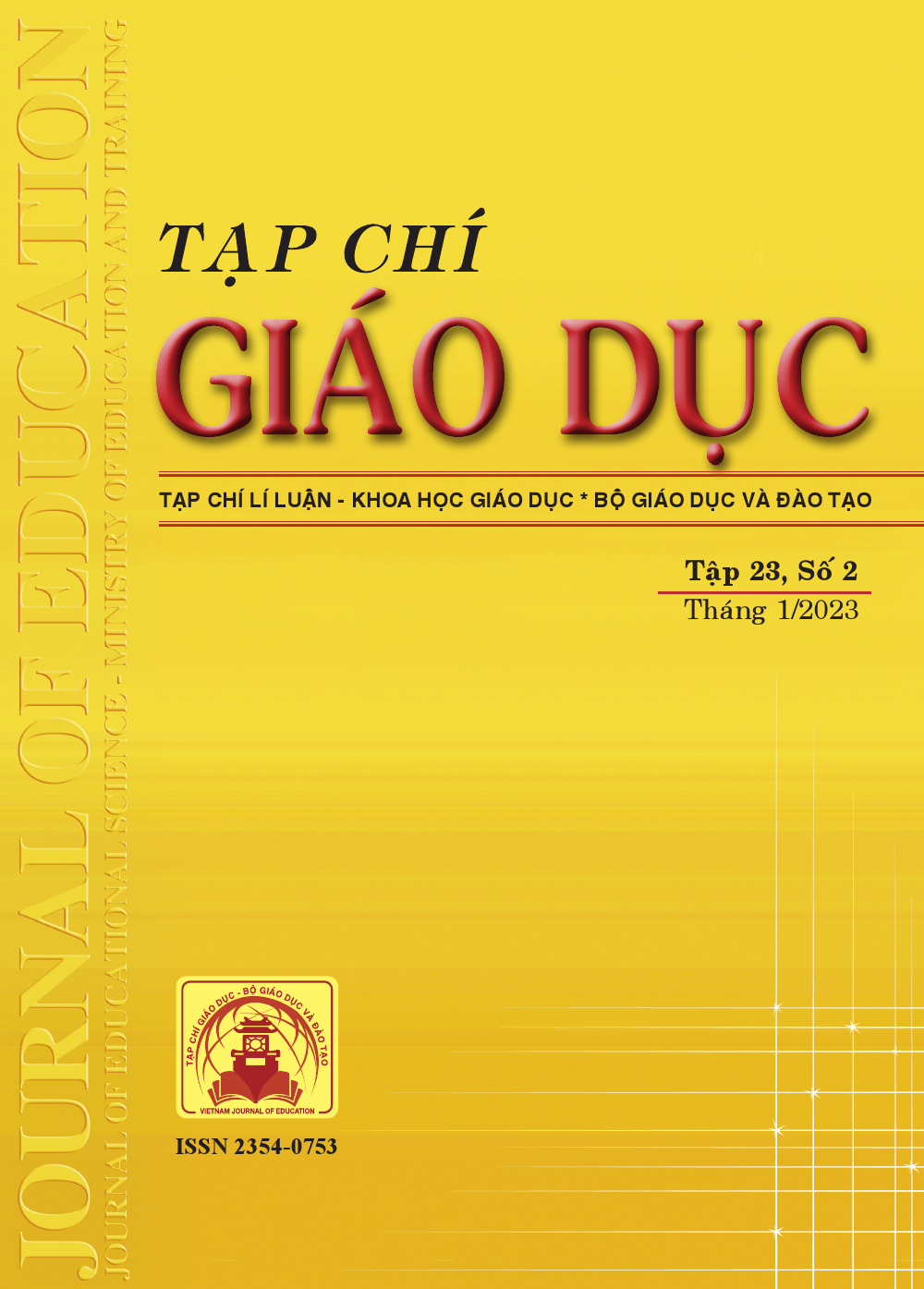Một số vấn đề về khung năng lực số cho học sinh trung học phổ thông trong Chương trình giáo dục phổ thông 2018
Tóm tắt
The transition from conventional physical teaching and learning to digitalised education is inevitable. The proficiency in using digital devices for both learners and teachers is a prerequisite for the fulfillment of educational goals in the technology age. Digital competence is recognized as one of the core competencies for lifelong learning. Students necessarily possess digital competence to study and work in today's open and global educational environment. The article synthesizes the concept and structure of digital competence in general education context from relevant publications, as a basis to propose an approach to a digital competence framework to develop digital competence for high school students under the 2018 general education curriculum. The article starts with the Introduction, in which the author analyzes the current digital transformation context and needs in Vietnam and the world; proceeding to the content, where the concept of student digital competency framework; the necessity of developing a digital competency framework for high school students; approaches to developing a digital competency framework for high school students are discussed.
Tài liệu tham khảo
Bartolomé, J., Garaizar, P., & Larrucea, X. (2021). A Pragmatic Approach for Evaluating and Accrediting Digital Competence of Digital Profiles: A Case Study of Entrepreneurs and Remote Workers. Technology, Knowledge and Learning, 27, 843-878. https://doi.org/10.1007/s10758-021-09516-3
Bộ GD-ĐT (2018). Chương trình giáo dục phổ thông môn Tin học (ban hành kèm theo Thông tư số 32/2018/TT-BGDĐT ngày 26/12/2018 của Bộ trưởng Bộ GD-ĐT).
Bộ GD-ĐT (2021). Thông tư số 09/2021/TT-BGDĐT ngày 30/3/2021 quy định về quản lí và tổ chức dạy học trực tuyến trong cơ sở giáo dục phổ thông và cơ sở giáo dục thường xuyên.
Bộ Thông tin và Truyền thông (2014). Thông tư số 03/2014/TT-BTTTT ngày 11/3/2014 quy định chuẩn kĩ năng sử dụng công nghệ thông tin.
Chang, J. H., & Huynh, P. (2016). ASEAN in Transformation - The Future of Jobs at Risk of Automation. International Labour Office Bureau for Employers’ Activities; ILO Regional Office for Asia and the Pacific.
Đỗ Văn Hùng (2022). Điểm yếu của thế hệ sinh ra cùng công nghệ. Báo Nhân dân. https://nhandan.vn/diem-yeu-cua-the-he-sinh-ra-cung-cong-nghe-post700774.html
ICDL Việt Nam (2019). UNESCO nhận định ICDL là một khung đánh giá kĩ năng sử dụng công nghệ thông tin chuẩn quốc tế. https://icdlvietnam.vn/unesco-nhan-dinh-icdl-la-mot-khung-danh-gia-ky-nang-su-dung-cntt-chuan-quoc-te.html
Law, N., Woo, D., & Wong, G. (2018). A Global Framework of Reference on Digital Literacy Skills for Indicator 4.4.2. UNESCO Institute for Statistics.
Lê Anh Vinh, Bùi Diệu Quỳnh, Đỗ Đức Lân, Đào Thái Lai, Tạ Ngọc Trí (2021). Xây dựng khung năng lực số cho học sinh phổ thông Việt Nam. Tạp chí Khoa học giáo dục Việt Nam, số đặc biệt tháng 1, 1-11.
Mai Anh Thơ, Huỳnh Ngọc Thanh, Ngô Thanh Tuấn (2021). Khung năng lực số cho sinh viên đại học: từ các công bố gợi mở hướng tiếp cận cho Việt Nam. Tạp chí Khoa học Giáo dục Kỹ thuật, Trường Đại học Sư phạm Kỹ thuật Thành phố Hồ Chí Minh, 66, 101-111.
Nguyễn Tấn Đại, Marquet Pascal (2018). Năng lực công nghệ số đáp ứng nhu cầu xã hội: Các mô hình quốc tế và hướng tiếp cận ở Việt Nam. Tạp chí Khoa học xã hội Thành phố Hồ Chí Minh, Viện Khoa học xã hội vùng Nam Bộ - Viện Hàn lâm Khoa học xã hội Việt Nam, 244(12), 23-39.
Pangrazio, L. (2019). Young People’s Literacies in the Digital Age: Continuities, Conflicts and Contradictions. Routledge.
Thủ tướng Chính phủ (2020). Quyết định số 749/QĐ-TTg ngày 03/6/2020 Phê duyệt “Chương trình Chuyển đổi số quốc gia đến năm 2025, định hướng đến năm 2030”.
Trần Đức Hòa, Đỗ Văn Hùng (2021). Khung năng lực số cho sinh viên Việt Nam trong bối cảnh chuyển đổi số. Tạp chí Thông tin và Tư liệu, 1, 12-21.
Tải xuống
Đã Xuất bản
Cách trích dẫn
Số
Chuyên mục
Giấy phép

Tác phẩm này được cấp phép theo Ghi nhận tác giả của Creative Commons Giấy phép quốc tế 4.0 .












